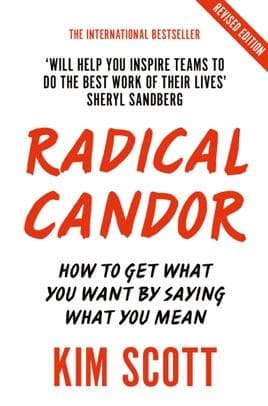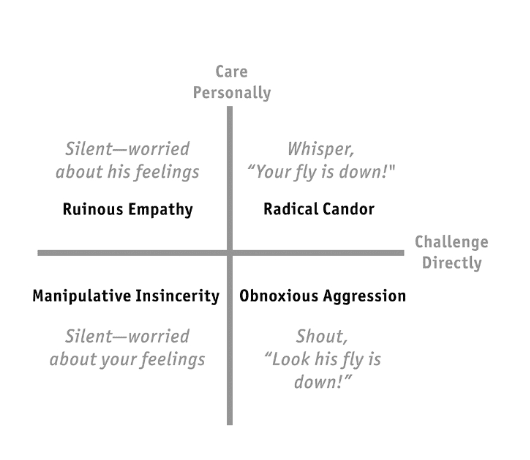Radical Candor
Apr 18, 2020
In my current role, I coach several employees towards having a fulfilling work career. For this, I try to listen particularly to what motivates a person, and try to connect this to opportunities that may arise for them. What I found is harder for me is to be direct when necessary. This is one of the main reasons I've bought and read the book 'Radical Candor' by Kim Scott, which a couple of my colleagues mentioned as a recommended read.

Radical Candor
In the book, Kim Scott explains how she experienced working for several big companies based in Silicon Valley, among others Apple and Google. The book contains many anecdotes of how leaders wind up in situations because they were unaware of how they guide their employees.
The Radical Candor framework
The pinnacle of the book is the Radical Candor framework. Kim Scott explains the success of leadership among two main axes: "Care personally" and "Challenge directly".
The "Care personally" axis is very much about how you as a person can open up to your employee, bringing your whole self to work and asking your employees to do the same. You could also say that this is very much about building a good relationship, in which you should be able to be open about everything. It's good to be able to share about your own life, because it allows your team members to also do the same towards you. You have to be able to listen to what your employee is telling you, their dreams, fears and also ideas such as how to improve the work or the team.
When it comes to leadership, "Challenge directly" is equally important. This means that you are able to be clear on when something is or is not sufficient. When something isn't enough, whether it is a small task or the way they fill in a particular role, it shouldn't be lingering for too long. The ability to be open about these topics is vital when you are a leader.
Either of these axes is a scale on which you can score high or low, and this can obviously vary from person to person (or even from moment to the other). Scoring low on either of the axes will lead to an ineffective reaction to a situation, which could be harmful. Challenging too much without caring for the other person will be considered as obnoxious and might harm trust. Caring too much without challenging will feel like you're afraid to tell that something is wrong, which could seriously backfire.

From the picture above you could see that the situation called 'Radical Candor' is the sweet spot. At this point, you're applying the right mix of caring personally as well as challenging them, which is a great base for growth. You're being kind and helpful. Suppose someone got some food stuck between their teeth, if you would do the effort to tell them in a discrete way, this is probably uncomfortable for you, but imagine if you didn't tell them and they had an important meeting afterwards...
However you react to a situation is definitely not a static thing. Kim Scott mentions that noone is always showing "Radical Candor", although you can influence this, such as by explaining this framework and asking your employees to give you honest feedback as a start.
Tools
In the book she also makes a strong case for 360 degrees feedback. Also, she provides several ways to give and get guidance, which means both praise and criticism. Guidance through feedback is the starting point for change and growth.
When getting to know an employee on your team, it is wise to do so-called 'Career conversations'. This technique focuses on your team member, finding out about significant changes in life and what they tell about someones key motivators and values. When you know more about this, you can start talking about their dreams, which don't necessarily have anything to do with their current role at the company. Knowing their dreams, together you could figure out which skills can be helpful in their job now, but also brings them a step closer towards their dreams. Next to getting to know an employee in this way, you could definitely have these conversations every year to get a clearer picture.
I can definitely recommend this book to anyone in a role that requires leadership. The combination of the framework, inspiring anecdotes and great tools make it a useful reference.
You can find more resources on RadicalCandor.com.

